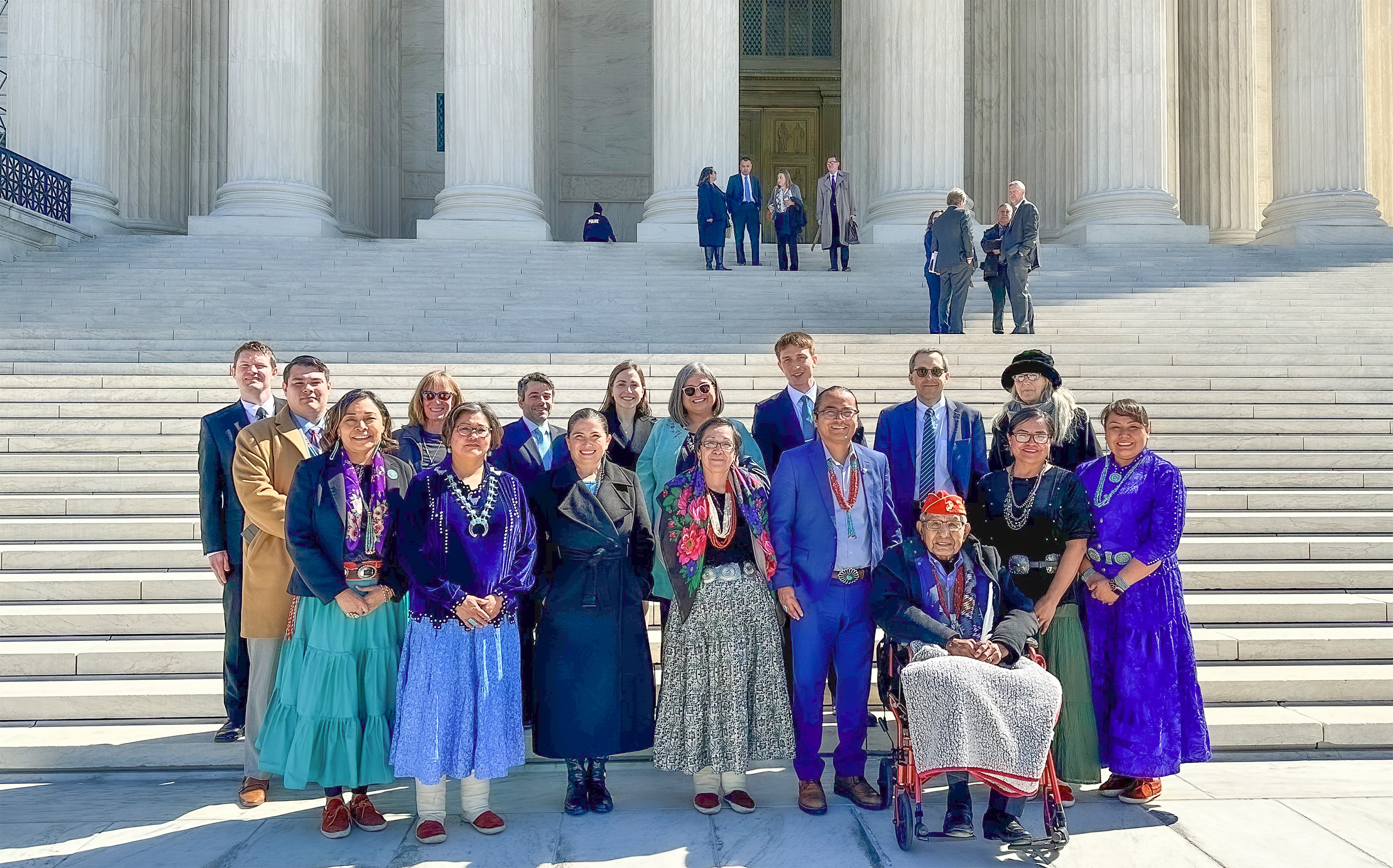
- Details
- By Elyse Wild
The Supreme Court heard oral arguments on Monday in Arizona v. Navajo Nation, a case that will determine the merits of a 150-year-old promise from the federal government to fulfill the water needs of Native American reservations.
In the suit, the Navajo Nation put forth an 1868 treaty in which the U.S. government guaranteed the tribe's agricultural needs, including water rights. As well, the Nation cites the Winters doctrine — a 1908 SCOTUS opinion considered to be the foundation of tribal water rights. The doctrine determined that water rights are deemed to have been established as of the date the federal government created the reservation involved and that those rights, once quantified, can be used for non-agricultural purposes.
RELATED: The Navajo Nation Should Not Have to Beg for Water at the Supreme Court
The Navajo Nation’s water rights have come into question as the tribe's primary water source — the 1,450-mile-long Colorado River — has dwindled by 20% over the past two decades amid relentless drought conditions in the region. Water from the river is allocated to seven states, with 40 million Americans relying on it for their water supply.
According to the Navajo Water Project, some 30% of families living on Navajo Nation —the largest Indian Reservation in the country — live without running water.
In Monday's oral arguments, which stretched nearly two hours, the federal government argued that treaty obligations did not require developing water infrastructure from a specific water source.
Frederick Liu, the assistant to the U.S. Solicitor General, said, “Those affirmative duties aren’t part of the treaty and because the government has never expressly accepted those duties, the Navajo Nation’s breach of trust claim can’t proceed."
Justice Sonia Sotomayor replied to Lui, “I don’t understand. If the treaty promises water, where do you get the idea that that is unenforceable."
Attorneys arguing for the state of Arizona stated that the Winters doctrine “is an intent; it does not define an affirmative duty.”
Justice Clarence Thomas asked Liu if not the Colorado River, where the tribe is expected to obtain water, to which Liu answered groundwater and aquifers.
Arguing on behalf of the Navajo Nation, attorney Shay Dvoretzky said, “the United States agrees that on paper the Nation has treaty rights to the water its people need, [but] we’re here because the United States says it doesn’t have to do anything to secure the water it promised.”
At one point during the arguments, Justice Brett M. Kavanaugh suggested that Congress, rather than the courts, be a more appropriate avenue for the tribe to pursue the issue.
Dvoretzky replied, "We've been waiting half a century for the political branches to solve this problem for the nation. It hasn't happened."
After the oral arguments, a slim majority of justices appeared to support the Navajo Nation’s right to move forward with its legal claim against the federal government, though it was less clear where the justices stood on the issue of the government’s obligation to provide water to the Navajo Nation.
Navajo Nation President Buu Nygren, Vice President Richelle Montoya, Speaker Crystalyne Curley, Council Delegates Eugenia Charles-Newton and Brenda Jesus, and Navajo Nation Attorney General Ethel Branch attended the hearing to offer their support for the Navajo Nation’s arguments in the case. They were also joined by former Navajo Tribal Chairman Peter MacDonald and Navajo Nation Water Rights Commission Chair Joelynn Ashley.
“This case goes beyond the fiduciary duty of the federal government. The outcome of this hearing may determine the livelihood of our Navajo people now, and for all future generations. The right to water centers on our right to a permanent homeland through our treaties and the prayers of our ancestors since time immemorial. As a child, I grew up in a home without running water and to this day, we still have over 30% of our people who don’t have access to clean running water in their homes. Our leaders long ago fought for our right to our homeland and that includes the right to water, the right to life,” stated Speaker Curley.
President Nygren said the case offers the United States an opportunity to live up to its trust responsibility, adding that “We honored our end of the deal, and they just need to honor their end of the deal.” Closing arguments are expected to be presented in April and the U.S. Supreme Court is expected to issue its ruling in the case in June.
More Stories Like This
Navajo Resources and Development Committee Issues Notice on Livestock Inspection RequirementsAmerican Prairie, Tribal Coalition Files Protest Over Rescinded Grazing Rights
Northern Cheyenne Push Back Against Trump Administration’s Effort to Alter Little Bighorn History
Florida Man Sentenced for Falsely Selling Imported Jewelry as Pueblo Indian–Made
Navajo Nation Declares State Of Emergency As Winter Storm Threatens Region
Help us defend tribal sovereignty.
At Native News Online, our mission is rooted in telling the stories that strengthen sovereignty and uplift Indigenous voices — not just at year’s end, but every single day.
Because of your generosity last year, we were able to keep our reporters on the ground in tribal communities, at national gatherings and in the halls of Congress — covering the issues that matter most to Indian Country: sovereignty, culture, education, health and economic opportunity.
That support sustained us through a tough year in 2025. Now, as we look to the year ahead, we need your help right now to ensure warrior journalism remains strong — reporting that defends tribal sovereignty, amplifies Native truth, and holds power accountable.
 The stakes couldn't be higher. Your support keeps Native voices heard, Native stories told and Native sovereignty defended.
The stakes couldn't be higher. Your support keeps Native voices heard, Native stories told and Native sovereignty defended.
Stand with Warrior Journalism today.
Levi Rickert (Potawatomi), Editor & Publisher

